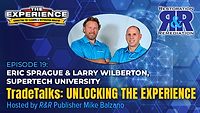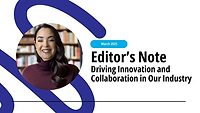Cultivating Curiosity: How Continuous Learning Drives Innovation in Restoration

Photo: Cemile Bingol / DigitalVision Vectors via Getty Images
Have you ever noticed how small children are relentless in their pursuit of “why”? They respond to almost every statement with the same simple question: “Why?” As we grow older, this innate curiosity often fades, replaced by a sense of certainty about the world. How often do we hear — or say ourselves — phrases like, “I know how to do that,” or “No need to explain; I’ve done this before”? While experience can build confidence, it can also close the door to possibilities. Yes, you may know how to do something and have done it the same way for years, but have you ever asked: Is there a better way? What new knowledge or technology could transform how we approach this?
Cultivating a culture of curiosity and continuous improvement is not just a lofty ideal—it’s a necessity. Encouraging lifelong learning within yourself and your organization fosters innovation, drives measurable results, and enhances retention, engagement and performance. In the fast-evolving restoration industry, staying curious is the key to staying competitive.
Organizations that prioritize continuous education and improvement provide a foundation for discovering new solutions and uncovering innovative approaches. They create a safe space for experimentation, where failure is seen not as an end but as a stepping stone to growth.
The pursuit of continuous learning must be intentional, incorporating a hybrid approach: instructor-led courses, adherence to IICRC Standards, hands-on training, gamified learning, and virtual sessions. For example, understanding how the ANSI/IICRC S800 Standard and Reference Guide for Professional Inspection of Textile Floorcovering supports professional inspections of textile floor coverings offers clarity and consistency in evaluating synthetic and natural materials. Similarly, the ANSI/IICRC S520 Standard for Professional Mold Remediation provides invaluable guidance for remediating mold-damaged structures and contents. These standards enable industry professionals to apply repeatable, reliable processes that enhance quality and effectiveness.
Building technical expertise, paired with strategic and visionary planning, is fundamental to staying ahead. A culture of learning demands proactive engagement with industry standards, emerging technologies, and innovative methods. This commitment not only advances individual growth but also strengthens the entire team and organization.
If you want your team to excel, invest in them. Understand their passions, embrace their potential, and lead by example. When you commit to your own development, you inspire others to do the same. Knowledge is power, and staying at the forefront of your field keeps your organization sharp, agile and prepared for the challenges ahead.
So, are you ready to see the world through a new lens? A curious mindset ignites change, fuels industries, and transforms the way we work. It all starts with one question: Why not learn more?
Looking for a reprint of this article?
From high-res PDFs to custom plaques, order your copy today!






